One year on: WHO’s sustained support for Syria’s earthquake recovery efforts
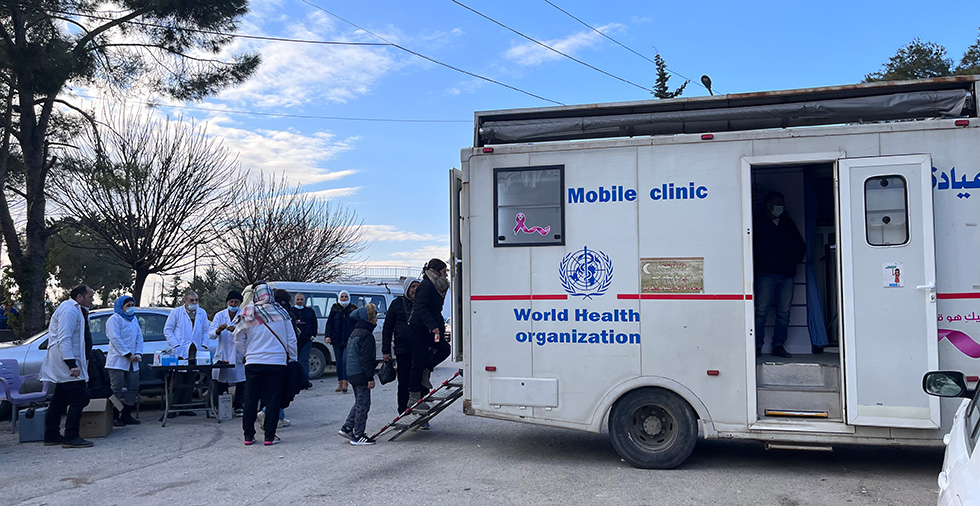
6 February 2024, Damascus, Syria – It is one year today since a devastating series of earthquakes struck Syria and Türkiye, causing more than 1400 deaths and injuring about 2357 people in Syria alone. Hundreds of thousands more were displaced. Today, WHO reflects on its work to help the people of Syria recover from the disaster and to support the reconstruction of affected areas.
Over the past year, WHO has supported nearly 69 000 outpatient consultations and over 9000 trauma consultations in Syria. More than 550 000 people in hard-to-reach areas have received essential health services through 28 mobile medical teams supported by WHO, and over 197 000 children have been vaccinated. WHO has also supported mental health services for over 922 000 traumatized survivors of the disaster.
These efforts have been critical in meeting immediate health needs and also preventing long-term disabilities and health conditions among the affected population.
WHO continues to provide critical medical equipment to support the Syrian health system in the earthquake-affected areas. Donated equipment includes computed tomography (CT) scanners, a magnetic resonance imaging (MRI) machine, X-ray machines, ultrasonic devices, ambulances, patient beds, ventilators, oxygen generators and patient monitors.
WHO has also provided enough components for 325 prosthetic devices to be made at the Rehabilitation and Artificial Limbs Centre in Damascus. WHO continues to work with communities to engage and inform them about how to reduce their health risks and better protect themselves in the aftermath of natural disasters.
Dr Iman Shankiti, acting WHO Representative in Syria, said: “As we reflect on the past year, the remarkable resilience of Syrian communities and health workers serves to inspire us in our own work. Their strength in the face of adversity drives our commitment to rebuild Syria’s health infrastructure, to ensure a healthier, more resilient future.”
WHO’s commitment to the people of Syria is unwavering. Thanks to the generous contributions of its donors, WHO will continue its work to support health system rehabilitation and enhance the health and well-being of those affected by this traumatic event.
First responder Dr Siham Makhoul reflects on February 2023 earthquake in Syria
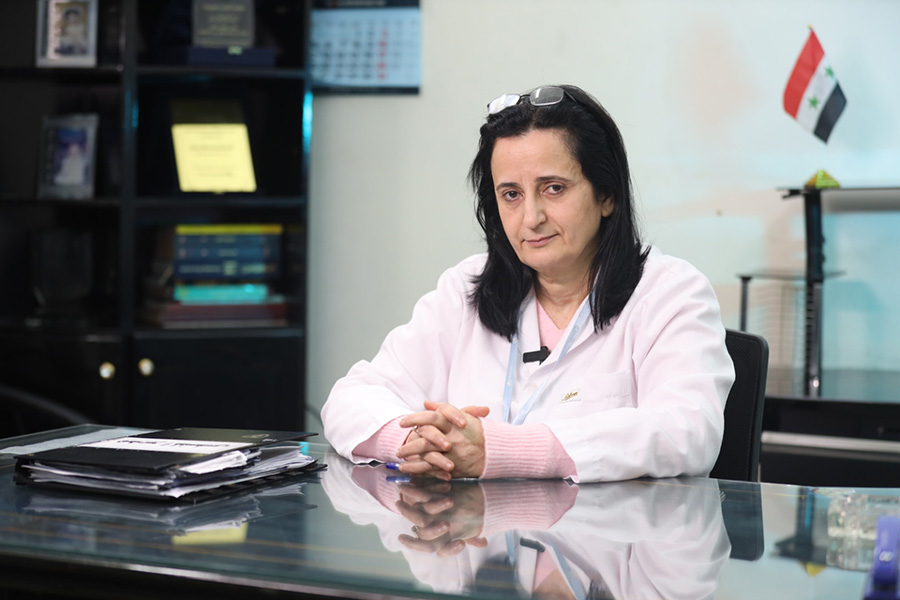 Dr Siham Makhoul, Director of the National Hospital of Latakia, Syria. Photo credit: WHO Syria6 February 2024 – I retain vivid memories of the earthquake. At just after 04:00, I was jolted awake by deep rumbling and roaring, and strong shaking. I live with my elderly mother, who is unwell, and my 2 sons; my first thought was to get them to safety. We got out of our building just in time before the quake totally flattened our home.
Dr Siham Makhoul, Director of the National Hospital of Latakia, Syria. Photo credit: WHO Syria6 February 2024 – I retain vivid memories of the earthquake. At just after 04:00, I was jolted awake by deep rumbling and roaring, and strong shaking. I live with my elderly mother, who is unwell, and my 2 sons; my first thought was to get them to safety. We got out of our building just in time before the quake totally flattened our home.
Once we were outside, my son asked me if I would be going to the hospital. I told him that of course I would go there immediately. There was no safe place for my family, so I took them with me. We all stayed in a room at the hospital for the first 24 hours.
At the hospital, I had to quickly assess the situation. How many staff did we have? How many surgeons were on call? Did we have enough ambulances, operating theatres, anaesthesia medicines? We had dire shortages of medicines and essential equipment like advanced X-rays, anaesthesia machines and [computed tomography] CT scanners.
Before the earthquake, managing the hospital from day to day was like walking a tightrope; I always felt that with the slightest nudge, we would fall. The earthquake wasn’t just a nudge, though; it was a powerful blow that shook us to the core.
In the days following the earthquake, the hospital was chaos. We were inundated with dead bodies, injured patients, and survivors looking for loved ones. One of our first admissions was a baby who had not survived. It was heartbreaking, but we knew we couldn’t let our emotions get the better of us.
One of my most painful memories is having to treat one of our own doctors, who had been admitted with very severe injuries. I could see that he was dead, but his colleagues tried to resuscitate him nonetheless. I told them that he had not survived and asked them to focus on the living. It was an agonizing moment.
I also remember the incredible solidarity. So many of our staff turned up spontaneously to help the emergency response. The local community brought food and drink. The Ministry of Health helped us tremendously. International organizations donated medicines and supplies. The hospital staff were remarkable. Our surgeons operated round the clock to save lives. Many nurses stayed in the hospital for days on end, treating wounds, caring for patients and supporting their families.
We got through those very difficult days, and we saved many lives. There is no doubt, though, that the trauma of this experience remains with us. To this day, you can see the panic in the eyes of our staff and patients whenever they hear unexpected noises.
Abd Nour’s triumph over leishmaniasis
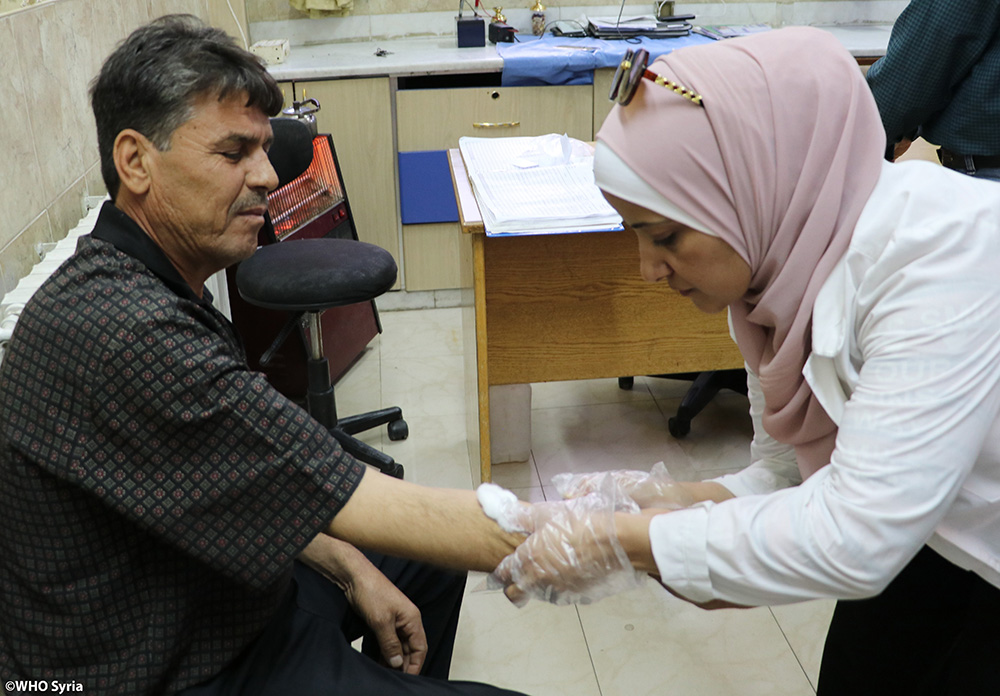 25 January 2024 – Abd Nour, a 52-year-old father from Aleppo, has been displaced 3 times with his family owing to the ongoing conflict in Syria. Once a shopkeeper, Abd became a day labourer to support his family after they were forced to flee their home. “For us, it has been very difficult,” he said. “It was hard to make plans not knowing how I would be able to support my family. As a father, I worried a lot.”
25 January 2024 – Abd Nour, a 52-year-old father from Aleppo, has been displaced 3 times with his family owing to the ongoing conflict in Syria. Once a shopkeeper, Abd became a day labourer to support his family after they were forced to flee their home. “For us, it has been very difficult,” he said. “It was hard to make plans not knowing how I would be able to support my family. As a father, I worried a lot.”
In summer 2023, Abd contracted leishmaniasis, which turned his world upside down.
Leishmaniasis remains a major health problem in Syria. Each year, the country typically records 70 000 to 80 000 cases of cutaneous leishmaniasis, the most common form. It is caused by a protozoan parasite that is transmitted to people through the bites of infected sandflies.
The neglected tropical disease has various clinical symptoms and, left untreated, can cause severe lesions, including ulcers. Infection can lead to serious disability and stigma, but timely treatment can prevent such complications. For Abd, the disease caused severe pain that left him unable to walk.
“I was terrified of the thought of passing this illness on to my pregnant wife and young son,” Abd explained.
WHO has been actively supporting the leishmaniasis programme in Syria since 2015, helping families and communities across the country. In 2023, in partnership with national authorities, WHO carried out leishmaniasis control activities in the most affected governorates: Aleppo, Hama and Idlib. This effort involved the indoor residual spraying of more than 73 000 houses, to protect over 369 000 people from the risk of infection. The programme also provides treatment, as well as training for Ministry of Health staff to enhance local capacity for effective case management.
WHO’s support for comprehensive, evidence-based treatment of leishmaniasis is a lifeline for patients. Dr Hassan Al-Zaher, Director of Al-Zahera Polyclinic in Damascus, where Abd was treated, reported that the clinic provided free treatment to 450 leishmaniasis patients in 2023 alone. This was possible thanks to WHO and Ministry of Health efforts.
Dr Iman Shankiti, Acting WHO Representative in Syria, further stressed the importance of comprehensive disease management to tackle leishmaniasis: “Beyond treatment of leishmaniasis, our efforts in Syria include educational campaigns and preventive measures to reduce the burden of this neglected tropical disease.”
Today, Abd Nour has resumed his daily work: “After looking back at my journey, I am thankful for every day. This experience taught me the importance of health and access to quality health care.”
Empowering displaced people in northwest Syria to regain their mental health
3 January 2024 – “After years of suffering, I am finally feeling empowered to regain control over my own destiny,” shared Hana, aged 29 years, who has suffered a series of devastating losses.
A decade ago, Hana was forced to flee her home when fighting intensified close to her village in northwest Syria. She left her relatives without saying goodbye, uncertain if she would ever see them again.
Having taken shelter at Sundian camp in Idlib governorate, Hana, her husband and 3 children struggled to make ends meet. The hardships endured in the camp took a serious toll on Hana’s mental health.
More than 12 years of conflict, displacement, lack of livelihoods and dire living conditions, combined with the February 2023 earthquakes, have been detrimental to the mental health of many people in northwest Syria.
WHO estimates that nearly 1 million people in northwest Syria suffer from a mental health disorder – of which 230 000 people suffer from a severe mental health disorder.
Ongoing cycle of loss
When 7 months pregnant with her fifth child, Hana suffered a miscarriage. The loss haunted Hana and she was left feeling overwhelmed by fear and anxiety.
Six months later, when the devastating earthquakes struck northwest Syria and Türkiye, Hana tragically lost her sister and the sister’s 4 children.
Hana felt trapped in a cycle of loss. She lost her appetite and more than 28 kg in weight and was no longer able to care for her children.
A recovery plan for Hana
Hana’s husband Ahmed saw her mental and physical health decline and was eager to help. He joined an awareness-raising session on mental health and psychosocial support run by Hope Revival Organization, a WHO partner. On learning of the services available, Ahmed went with Hana to the mental health clinic in the camp.
Hana had a series of psychosocial assessments and was prescribed medications and given a recovery plan. This plan included 8 therapy sessions with a psychologist to explore Hana’s emotions, thoughts and behaviours.
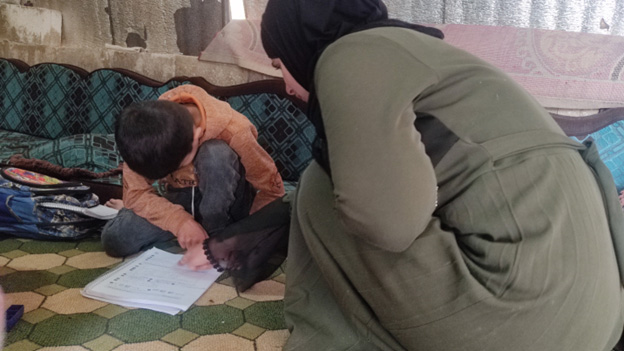 Hana helps her youngest son with his homework at Sundian camp, Idlib governorate. Following the successful completion of her treatment, Hana has been able to re-engage in caring for her children. Photo credit: WHO/ Hope Revival Organization Remarkable changes were soon observed in Hana. She regained her ability to care for her children and reconnected with her extended family. Her eating habits improved, and her mood stabilized.
Hana helps her youngest son with his homework at Sundian camp, Idlib governorate. Following the successful completion of her treatment, Hana has been able to re-engage in caring for her children. Photo credit: WHO/ Hope Revival Organization Remarkable changes were soon observed in Hana. She regained her ability to care for her children and reconnected with her extended family. Her eating habits improved, and her mood stabilized.
“Mental health services are an absolute necessity given the harsh living conditions in these camps,” said Hana’s psychologist. “The mental health services we provide to Hana and so many others equip them with the skills to manage stress, adopt new, positive thoughts and navigate their emotions.”
Seeing Hana’s progress, her mother also sought support at the mental health clinic.
“My journey has been challenging,” said Hana, “but with these services, it has ultimately led me to a place of joy and strength.”
The need to sustain and scale up support
Mental health care remains scarce in northwest Syria. Only 4 health facilities provide psychiatric services and just 2 psychiatrists serve a population of 4.5 million. WHO has been pivotal in supporting these facilities, through capacity-building, technical supervision and provision of psychotropic drugs and other medicines.
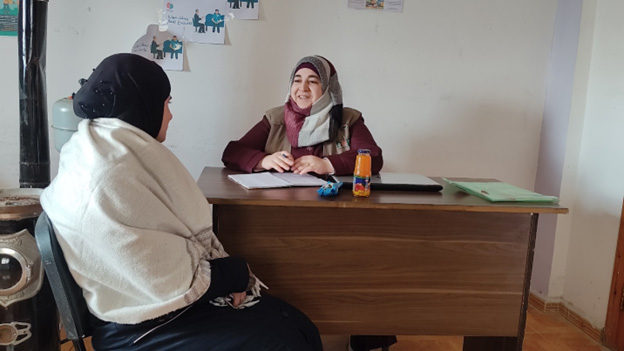 Mental health clinics set up in camps for internally displaced people in northwest Syria provide psychosocial support and therapeutic interventions. Photo credit: WHO/ Hope Revival Organization In 2023, with generous funding from the Central Emergency Response Fund, WHO supported the provision of mental health services for internally displaced people and host communities in northwest Syria. It did so through existing mental health services in primary health care facilities and by setting up specialized mental health clinics and mental health psychosocial support mobile teams.
Mental health clinics set up in camps for internally displaced people in northwest Syria provide psychosocial support and therapeutic interventions. Photo credit: WHO/ Hope Revival Organization In 2023, with generous funding from the Central Emergency Response Fund, WHO supported the provision of mental health services for internally displaced people and host communities in northwest Syria. It did so through existing mental health services in primary health care facilities and by setting up specialized mental health clinics and mental health psychosocial support mobile teams.
Mental health clinics set up in camps consist of a resident mental health gap action doctor, 2 psychologists and 3 psychosocial workers. Each clinic serves as a hub for integrated services, offering individual consultations, psychoeducation sessions, and peer support. To extend the clinics’ reach, mobile teams run awareness-raising sessions and provide services in remote areas of northwest Syria.
In addition, the Mental Health and Psychosocial Support Technical Working Group in northwest Syria led by WHO supports mental health and psychosocial assessments, service mappings and the integration of mental health services within primary and secondary health care facilities to ensure greater access to such services.








